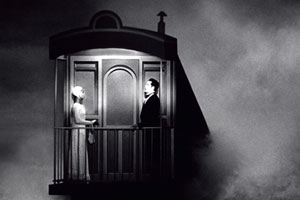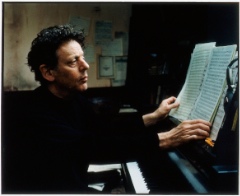Interested in Einstein Revival? – An Anatomy of auditioning for Einstein on the Beach
Editor’s Note: Lindsay Kesselman will sing with the Phillip Glass Ensemble for the duration of the 2012-2013 international tour of Einstein on the Beach. She’ll also be guest blogging on umsLOBBY.
I don’t know about you, but I am a fan of Philip Glass. My iPod contains everything from his symphonies to his string quartets, his film scores and solo piano music, and of course, his operas. I listen to him in the car, while I’m cooking, while I’m thinking, at the gym… sometimes you are just in a Philip Glass kind of mood. So, you can understand why I briefly stopped breathing when I received an email from a new music-singing friend last March entitled, “Interested in Einstein Revival?” I wondered how quickly I could respond without sounding desperate, but then promptly ignored this concern and wrote back, um…yes. I was interested.
As a singer, I’m usually fairly zen about auditions. Many variables are out of our control, so I try to be prepared, do my best work, but spend as little time obsessing about it as possible. I pretend I don’t care about the outcome, and tell myself that I will be successful regardless of whether or not I get the part.
The truth was, however, that this time I did care, and no amount of denial-ridden inner monologue would convince me otherwise. I sent in a resume and samples of my singing and then tried to preserve my outer calm while I waited. I didn’t have to wait long before being invited to come to New York in early May to audition at the Baryshnikov Arts Center for a chorus role.
Being part of Einstein on the Beach was beginning to become a real possibility, so I let myself get a little bit excited. I started listening to sections of the piece and I watched a wonderful documentary on the making of Einstein entitled “Einstein on the Beach: The Changing Image of Opera” which, as a side note, I would recommend highly to anyone as a fascinating introduction to the piece, or as a way to learn more for those that are already familiar with it. (All the members of my family “might” be receiving this documentary for Christmas this year.)
I also started practicing, both the piece I had decided to sing for the audition, as well as exercises I drew from Einstein. The text of the opera is comprised of numbers and solfege syllables, sometimes sung very rapidly and in constantly-changing rhythmic meters. I figured that if by some chance I was cast, I would need to start practicing immediately so I would not become hopelessly tongue-tied in rehearsals.
So, I auditioned in NYC for Lisa Bielawa, Michael Riesman, and Linda Brumbach. I was the first to sing that day (we were asked to prepare something in English), and then Michael Riesman asked me to say aloud 1 2 3 4, 1 2 3, 1 2 3 4 1 2 3, etc as quickly as possible. Aha!! My compulsive practicing of numbers had paid off. The audition was over before I knew it, and I flew home to wait again, with ever-building excitement and anticipation.
Fortune smiled, and I was invited to a callback audition three weeks later, this time to sing excerpts from Einstein, the choruses “Night Train” and “Spaceship,” as well as to complete a movement/dance audition. I arrived at the DANY Studios along with 24 other singers, all vying for 12 spots (3 of each voice type). Everyone knew each other, greeted each other warmly, with hugs, like at a big family reunion. I remember thinking about how COMPLETELY different this was from any other audition I’d ever done, and I’d hoped I’d have the opportunity to become part of this strange and wonderfully supportive community.
We were divided in half, and when it was our turn, we filed into a dance studio and faced a long table. There were many important people in the room, including a camera crew for an upcoming documentary, but I found myself staring directly at Robert Wilson. I knew what he looked like and had known he would be there, but as soon as I saw him, various highlights from his staggeringly impressive bio began running through my brain like ticker-tape, and I was stunned. I took a deep breath and decided I could be star-struck later: now was the time to focus.
We sang through the prepared sections up to tempo, I was asked to jump up to a descant line above the choir, and I started feeling pretty good. This wasn’t so bad, I thought. Then, we were divided in half again for the dance audition. Ever since the callback invitation, I tried to psych myself up for this part, but let’s be clear: I am not a dancer by any stretch of the imagination. We started off easily enough, with some focus and posture exercises. Then, Wilson asked us to cross the room, but to take at least 3 minutes to do so (very, very slowly) and, not allowing the initiation point of our movements to be seen. A fascinating challenge, one that required us to spend at least the first 30 seconds to transfer our weight to one foot.
Then, my moment of truth came. Robert Wilson left his place at the table to demonstrate a “routine” for us, which we were to instantly memorize and then re-create. As we watched, our collective adrenaline turned quickly to collective dread as the slow, stylized movement of the routine kept going… and going. Silently, I cursed my 10-year-old self for not continuing with ballet. I thought, “Well, that’s it. This was fun, but my lack of dance training will cost me this job.” No one moved a muscle when Wilson told us it was our turn. Then, slowly we forced our legs back to our positions and made the routine up the best we could, mimicking the style of the movement, if not its exact steps.
Ultimately, a miracle happened, and, a few days later, I got the invitation to join the tour. Now, months later, I am still giddy with excitement at the adventure that is about to begin. As I become familiar with each segment of my 85 page score, which will eventually expand into 4 ½ hour show, I know that in a matter of weeks, I will be singing this music in my sleep and it will become a part of who I am for the next 13 months.
My voice teacher in graduate school always told me that my path would be different, that it would probably be somewhat non-traditional, but that I would find my way. This year that path has led me to Philip Glass and Einstein on the Beach and I truly could not be more grateful.
Have a question for Lindsay, or curious about something to do with Einstein on the Beach? Use the hashtag #askeinstein on Twitter or comment below.
Einstein on the Beach: Q&A with Lindsay Kesselman
 Widely credited as one of the greatest artistic achievements of the 20th century, Einstein on the Beach is a rarely performed and revolutionary work that launched director Robert Wilson and composer Philip Glass to international success when it was first produced in Avignon, France in 1976, with subsequent performances in Europe and at the Metropolitan Opera. It is still recognized as one of their greatest masterpieces. Now, nearly four decades after it was first performed and 20 years since its last production, Einstein on the Beach will be reconstructed for a major international tour, including the first North American presentations ever held outside of New York City.
Widely credited as one of the greatest artistic achievements of the 20th century, Einstein on the Beach is a rarely performed and revolutionary work that launched director Robert Wilson and composer Philip Glass to international success when it was first produced in Avignon, France in 1976, with subsequent performances in Europe and at the Metropolitan Opera. It is still recognized as one of their greatest masterpieces. Now, nearly four decades after it was first performed and 20 years since its last production, Einstein on the Beach will be reconstructed for a major international tour, including the first North American presentations ever held outside of New York City.
Prior to the production’s final technical rehearsals and world première in Montpelier, France, UMS will host the production’s creators, musicians, performers, and crew for three weeks as they reconstruct and rehearse the work for what is likely to be the final world tour designed and led by its original creative team. A rare chance to see a work of this scale in progress, these preview performances will be the only opportunity to see Einstein on the Beach in the Midwest.
Lindsay Kesselman will sing with the Phillip Glass Ensemble for the duration of the opera’s 2012-2013 international tour. She’ll also be guest blogging on umsLOBBY.
UMS: As an emerging artist, how do you approach a seminal work like Einstein on the Beach?
Lindsay Kesselman: With great humility….and tons of excitement! I remember hearing about Einstein on the Beach for the first time as a freshman in my undergraduate music history class. Even then, I remember thinking that this was my kind of opera, and exactly the sort of piece I hoped to sing one day. Now, being given the chance to participate in a re-creation of this incredible work, and in a production of this size and scope, is nothing short of thrilling.
UMS: You studied at voice at Michigan State University and have Michigan roots. Does beginning with this production in Michigan hold any special importance for you?
LK: Definitely. I received a B.M. in voice and music education from Michigan State University in 2006 and, after spending a few years away, returned to live in Ann Arbor 2 years ago. I regularly attend UMS events, and feel so fortunate that we will have the opportunity to workshop the piece and give preview performances here at the Power Center. This is a wonderfully vibrant community, filled with people who are curious and interested in a diverse array of arts, and I am so excited that they will have the chance to see this production first. For me personally, it will be wonderful to share this experience with my local family and friends, and it will be a luxury to be home during the month of January!
UMS: What are you most looking forward to during this production? What do you hope to learn from your work on this production?
LK: There are so many things to which I am looking forward…the chance to learn from the extraordinary visionaries and creators of this piece, Philip Glass, Robert Wilson and Lucinda Childs, will be a once-in-a-lifetime privilege. Learning from and growing with the remarkable members of the Philip Glass Ensemble, my fellow singers, and the entire cast and crew, will be life-changing. And certainly, having the chance to introduce this piece to a new generation of audiences across the world will be humbling and truly unforgettable.
Have a question for Lindsay, or curious about something to do with Einstein on the Beach? Use the hashtag #askeinstein on Twitter or comment below.



